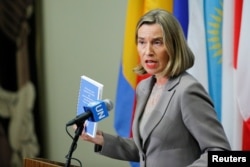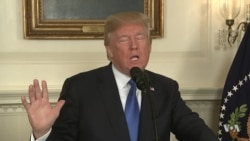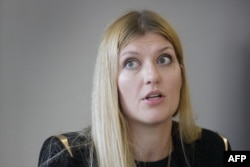Iran's president said Friday that the nuclear deal it signed with six world powers in 2015 could not be revoked, after U.S. President Donald Trump announced he would not certify that Iran was in compliance with it.
In a nationally televised speech following Trump's remarks, Iranian President Hassan Rouhani urged all signatories to the agreement to honor their commitments. He called the Joint Comprehensive Plan of Action (JCPOA) "an outstanding achievement" in international diplomacy and said Iran would continue to comply with it.
"The Islamic Republic of Iran will not be the first to withdraw from the deal. But if its rights and interests in the deal are not respected, it will stop implementing all its commitments and will resume its peaceful nuclear program without any restrictions," Rouhani said.
The Iranian leader also hit back at Trump's characterization of Iran as a "dictatorship" and "rogue regime," calling the American president a "liar" and a "dictator."
"Today the U.S. is more isolated than ever against the nuclear deal, isolated than any other time in its plots against [the] people of Iran," Rouhani said.
He rejected Trump's remarks listing Tehran's support for international terrorism, calling the examples "baseless accusations" and adding that the "Iranian nation does not expect anything else from you."
EU reaction
European Union foreign policy chief Federica Mogherini held a news conference in Brussels minutes after Trump spoke, saying the EU and the rest of the international community were committed to preserving the deal.
"It is not a bilateral agreement. It does not belong to any single country. And it is not up to any single country to terminate it," Mogherini said.
She noted the multilateral agreement had been unanimously endorsed in U.N. Security Council Resolution 2231.
"We cannot afford as an international community, as Europe for sure, to dismantle a nuclear agreement that is working and delivering — especially now," Mogherini said.
The EU foreign policy chief noted that the International Atomic Energy Agency had verified eight times, via a "comprehensive and strict" monitoring system, that Iran was meeting all its nuclear-related commitments.
"There have been no violations of any of the commitments included in the agreement," Mogherini told reporters.
IAEA Director Yukiya Amano released a statement saying Iran was already subject to the world's most robust nuclear verification regime and was implementing the deal's requirements.
WATCH: Highlights of Trump's Speech on Iran Nuclear Deal
In a joint statement, British Prime Minister Theresa May, French President Emmanuel Macron and German Chancellor Angela Merkel said they were concerned about the possible implications of Trump's decision not to recertify the Iran nuclear deal.
"Preserving the JCPOA is in our shared national security interest. The nuclear deal was the culmination of 13 years of diplomacy and was a major step toward ensuring that Iran's nuclear program was not diverted for military purposes," the European leaders said in the statement.
Opportunity seen
Asked whether he was confident he could get the Europeans to renegotiate the Iran deal, U.S. Secretary of State Rex Tillerson said Friday that he thought there was a real opportunity to address all the threats posed by Iran.
"I fully expect that our allies and friends in Europe and in the region are going to be very supportive in efforts undertaken to deal with Iran's threats," Tillerson told reporters.
In Moscow, Russian Foreign Minister Sergei Lavrov said his country was committed to supporting the Iran nuclear deal.
Ahead of Trump's remarks, the Kremlin warned that if the United States abandoned the Iran nuclear deal, Tehran would be likely to quit it as well. Russia is a signatory to the JCPOA, along with the United States, Iran, Britain, Germany and France.
Chinese Foreign Ministry spokesperson Hua Chunying also voiced support for the Iran nuclear deal during Friday's regular news briefing.
"China's position on the Iranian nuclear issue has been consistent. The JCPOA has played a key role in upholding the international nuclear nonproliferation regime and the peace and stability of the Middle East region," she said. "We hope that all relevant parties will continue to uphold and implement the JCPOA."
Praise from Netanyahu
Praise for Trump's tough stance on Iran came from Israeli Prime Minister Benjamin Netanyahu, who released a video statement in English.
"I congratulate President Trump for his courageous decision today. He boldly confronted Iran's terrorist regime," Netanyahu said.
Saudi Arabia, the United Arab Emirates and Bahrain also expressed strong support for Trump's shift in policy toward Iran.
The Saudi Press Agency said Riyadh praised Trump's "vision" and commitment to work with U.S. allies in the region in order to face common challenges, particularly "Iran's aggressive policies and actions."
But the International Campaign to Abolish Nuclear Weapons, which was awarded the 2017 Nobel Peace Prize, strongly criticized Trump's decision.
The group's executive director, Beatrice Fihn, said Trump's "attempt to disrupt" the Iran deal despite Tehran's compliance was a reminder of the "immense nuclear danger now facing the world" and the "urgent need" to prohibit and eliminate nuclear weapons.
"In a time with great global tension, with increasing threats of nuclear war, the U.S. president is igniting new conflict rather than working to reduce the risk of nuclear war," she said.








